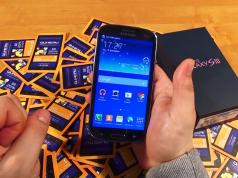Not long ago we discussed what distinguishes fake cosmetics from real ones and how to protect yourself from a surrogate. Unfortunately, there are situations when it is too late to study the rules of purchase, and you need to decide what to do with a counterfeit product. First of all, of course, you shouldn't use it. Yes, it’s a pity for the money spent, but your health is more valuable. Well, what is recommended to do - this material will tell you.
How cosmetics get to Russia
Without exception, all manufacturers, both leaders in the perfume and cosmetics industry and medium-sized companies, have their representative offices in Russia. All major retail chains have direct contracts with them. Goods are delivered to representative warehouses, then from there either directly to stores or to distribution centers of retail companies. First, of course, all products undergo certification and customs clearance. In this regard, it can be argued that our compatriots use absolutely identical cosmetics as citizens of other countries. There are and cannot be any differences in properties and quality.
Regarding counterfeits in large chains, their representatives claim that these rumors are groundless, because the federal chain sells tens of thousands of pieces of the same volume of fragrance, one color of lipstick. And it is simply impossible to imagine that a counterfeit manufacturer has such capacity, developed logistics and a huge number of contractors - each product has a very complex formula, bottle, and packaging. For example, in the case of packaging a makeup product - for its production it is necessary to make a mold for each tube and box - the cost of such a product can be easily found on the Internet - about $10,000 for one mold.
But as for cosmetics that are sold in stalls, if the seller does not have certificates of conformity, then these are either counterfeit goods or cosmetics imported without the consent of the copyright holder (the so-called parallel import).
The biggest problem is counterfeit goods, since they are almost completely copies of original goods. Fraudsters copy design elements, trademarks of original product series or brands, but their quality and safety are not confirmed in the manner prescribed by law. As a rule, the packaging does not contain consumer information in Russian, and they are sold at a price significantly lower than the original (2–3 times).
Goods that were imported without the consent of the copyright holder (“parallel import”) are original goods. The products themselves have a label, but it usually does not contain consumer information in Russian, which is contrary to the requirements of the Consumer Protection Law. Also, the product’s compliance is not confirmed with the established legal requirements (there are no declarations of conformity). Thus, despite the fact that the goods are original, their sale is formally unacceptable from the point of view of law, since it violates the rights of consumers and the copyright holder. The price of such products is slightly lower than the price of the original.
What to do if you bought a fake
Many people do not know what to do if a “fake” product is purchased, where to go and who to contact.
If you find obvious signs of defective or counterfeit cosmetics - texture, smell, color, allergic reactions, then go straight to the store where you purchased this product. The store is required to accept goods of inadequate quality. If your products are not accepted, then go to court, attaching all evidence of purchase - a receipt, and if you don’t have one, then a bank statement (if paying by card) or a witness statement. The bottle may also retain store attributes, which also indirectly confirms the purchase and can be used in court.
Do not buy anything second-hand, because in this case it will be almost impossible to prove something and punish the culprit. If you have a check, but, for example, the seller has changed his place of business, then using the TIN you can easily identify the attacker and bring him to justice.
Consumer protection experts say they receive a constant stream of people complaining about cosmetics distributed through network marketing. Many people have allergic reactions and inflammation, even if the cosmetics are not from the cheap segment. In such cases, the money can be returned to buyers through the court. But requests from customers who bought cosmetics in large well-known chains are almost never received.
Why you shouldn't take risks
Some of us still use counterfeit products, thinking that nothing bad will happen, they say, I’m already taking the fifth tube, and there are no problems. “The miser pays twice” - this is the proverb you should remember if you want to buy an inexpensive, supposedly original cosmetic product of unknown origin, wanting to save money.
Criminals simplify the recipe as much as possible, often removing expensive concentrates and active ingredients, so at best we get a harmless product, but without any hope of effective care. However, most often counterfeit manufacturers put very low quality preservatives and fragrances in jars. As a result, health problems can become our long-term companions, even if these medications are discontinued - itching, burning, redness, peeling, allergies.
Have you ever come across fakes?
Apple smartphones are a very popular product: they are expensive and in great demand. Unfortunately, dishonest people do not miss the opportunity to make money from iPhone buyers, and often they use outright criminal schemes like the one we will talk about today.
The attacker buys a cheap Android smartphone on a site like AliExpress that looks exactly like an iPhone, and then goes to a regular store and buys the exact same model, only the real thing. Then he publishes an advertisement on a flea market like Avito or Yula about the sale of an iPhone in perfect condition and at a big discount (10-20 thousand rubles cheaper than in the store). He arranges a meeting with a potential buyer and takes with him two smartphones: a real iPhone and a fake one, both with SIM cards inserted. The scammer will need an accomplice who, upon seeing the pre-designated gesture, will have to call the iPhone.
The seller allows the buyer to verify the “purity” of the product: check the serial number, IMEI, check the unlinking from Find my iPhone and the ability to log in to iCloud; You can even check the quality of the connection. The buyer is satisfied with everything, and he is already reaching for his wallet to give the money, but at this moment the seller gives his accomplice a pre-arranged signal. A ringtone sounds on the iPhone, the seller apologizes, says that he received a call on an important matter, answers the call and pretends to be talking about something boring, which will lull the victim’s vigilance. After the conversation ends, the seller casually puts the iPhone in his bag or inner pocket, and then takes it back, saying that he put it away out of habit.
The seller offers to complete the transaction, takes out the SIM card, puts the carefully checked smartphone in a box, gives it to the buyer, takes the money, puts it in his wallet and leaves in an unknown direction. His earnings amounted to... the difference between the cost of the original iPhone model and the fake one, minus the discount he made for the fact that the smartphone was not new.
At home, the buyer will discover that he was sold a fake, which costs at best 5 thousand rubles and, most likely, will guess at what point the substitution occurred - when the fraudster removed the real iPhone, took out a fake instead and put it in a box. Proving fraud will be very difficult, if not impossible, because the police or court may assume that the buyer himself replaced the smartphone and is now slandering an honest person.
What happened in the end? The fraudster sold a cheap Android smartphone for the price of an iPhone and became richer by several tens of thousands of rubles. In addition, he still has the original iPhone, which he can either use again to sell a fake, or throw it off at a flea market or pawn shop at the market price.
It is very easy to protect yourself from this scam. Now you know what scenario the scammers use, and even if some nuances differ, in a similar situation you will still have the understanding that they are trying to heat you up. But the most important thing is that before you give money for a product, take it again, don’t let it out of your hands and check again whether it’s really what you need. If at this moment the seller starts to get nervous or tries to take your smartphone away, this is a clear sign that he is not at all interested in a fair deal.
Based on Article 1252 of the Civil Code, it is prohibited in the Russian Federation to import and trade products that violate the copyright of the official manufacturer and mislead ordinary consumers regarding the quality of purchases.
Do you need to go all the way (up to filing a lawsuit) if your rights have been violated?
YesNo
Selling counterfeit goods is one of the ways for unscrupulous entrepreneurs to profit from someone else’s brand or trademark, which is punishable by administrative and criminal law throughout the world.
In 2016, actress Anna Khilkevich stated that the D&G bag she bought at TsUM was a fake. Although the information was not confirmed and Anna later publicly apologized, there is no need to let down your guard. Counterfeit goods can also be found in large chains, although with great rarity.
Citizens of the Russian Federation have the right to complain about retail outlets selling counterfeit products and demand their complete closure. Such claims should be considered by: the Federal Tax Service, the Federal Customs Service, the Antimonopoly Service of the Russian Federation and other supervisory authorities, including the judiciary.
How can a citizen distinguish a purchased fake from a counterfeit?
The rights of official manufacturers of goods in the Russian Federation are protected by Chapter 76 of the Civil Code, which assigned them individual rights to their trademarks and provided for liability for the unauthorized use of other people’s labels, marks, brands.
When making a complaint about a purchase in an online store or a regular retail outlet, a citizen will have to provide a link to the rule of law violated by the seller. Therefore, the consumer should clearly distinguish between counterfeit and counterfeit goods:

According to statistics, the most common counterfeit items are knitted items, and among the manufacturing companies, Adidas is the most often counterfeit.
An important difference between a counterfeit product and a counterfeit one is that it always infringes on someone else’s intellectual rights (copyright, patent for an invention, trademark, brand name.
IMPORTANT: products manufactured by an official manufacturer who has already lost its rights to a trade name or brand are also counterfeit.
When choosing an item in a store, pay attention to the following facts that indicate the product is counterfeit:
- The packaging is of poor quality;
- There are no instructions for the product or the document is a photocopy of the present;
- Low cost of goods or insurance for them.
Additionally, ask the seller for documents that confirm his intellectual rights to trade in such goods (license agreements, certificates, supply agreements or invoices).
Claim for a counterfeit purchased on the Internet
The Association of Internet Trade Companies in the Russian Federation revealed that in 2016 more than 13 million counterfeit products were imported into Russia. Today in our country there is no self-regulatory organization that would control online stores. Therefore, the main body that cancels scam sites is Roskomnadzor.
In accordance with a special Regulation adopted in 2009, Roskomnadzor has the right to block a site selling counterfeit (counterfeit) goods after an inspection.
Citizens who have purchased a counterfeit have the right to make an electronic claim on the Roskomnadzor website or formalize the requirements in a written complaint and personally take it to the registry of the supervisory service, indicating:
- The name and email address of the online store, its contacts indicated on the website;
- Your full initials and contact details for reply;
- Documents confirming the purchase of the counterfeit from this particular supplier;
- Description of the product, the characteristics of which fall under criminal or administrative regulations on counterfeit products;
- The requirement to inspect the outlet and hold its manager accountable.
Every year, independent companies appear online that accept complaints from consumers and monitor the activities of unscrupulous online stores. One of these services is the website http://fakelist.ru/, which reviews customer statements about counterfeit goods and forwards them to the competent authorities.
Any citizen who has sent a complaint to this service can be sure that his requirements will be considered and the suspicious online seller will be checked. If violations of intellectual rights to products are detected in the store’s activities, the service’s lawyers will notify the official manufacturer and will achieve the cancellation of the fraudulent site.

A typical site selling a “copy” of a famous brand. The picture shows the original product, and when you order, you will receive “something” vaguely reminiscent of the advertised product.
To seek help from Fakelist, a consumer who has purchased a fake needs to enter his or her email into the service’s electronic form, provide a link to the website of the store selling the counterfeits, and send a message to the site administrator.
Other services that prevent the sale of counterfeits
According to Article 18 of Federal Law No. 2300-1, every buyer has the right to demand his money from the seller if the quality of the purchase does not correspond to what was declared by the seller. Initially, a complaint about a counterfeit product is sent to the store where it was purchased.
Failure to respond to a complaint by the administration of a retail outlet gives the buyer the right to contact the authorities involved in the consideration of complaints about counterfeit products:
- Federal Antimonopoly Service;
- Federal Customs Service;
- Federal Tax Service;
- Rospotrebnadzor;
- The prosecutor's office and the court.
The reasons for the buyer's request may be:
- Inconsistency between the product description and its true characteristics and functions;
- Lack of instructions and documentation for the purchased item;
- The seller lacks documentation indicating the legality of the rights to implement it;
- Provision by the store of information that is not true (the buyer was assured that the product was branded, but the quality indicates a fake);
- Failure to provide a citizen with information about the real manufacturer (importer) of products (Article 12 of Federal Law No. 2300-1).

Even products manufactured by an official manufacturer may turn out to be counterfeit. For example, declarations often indicate parts for which duties are lower, but finished products are transported.
Article 1252 of the Civil Code of the Russian Federation established that counterfeit products and fakes must be confiscated from sellers and destroyed without material compensation to their sellers.
Consequences of inspections for stores selling counterfeits
Supervisory authorities that have received and considered complaints from consumers must check the documentation of the point of sale, the quality of the products sold, warehouse facilities and the transport on which the goods are delivered.







